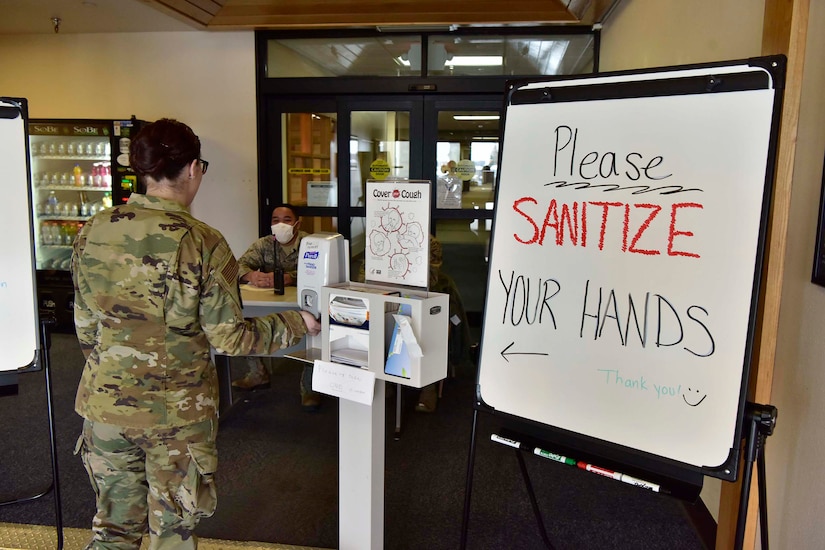April 2, 2020 | BY Jim Garamone , DOD News
The Joint Staff's director of manpower and personnel
discussed the personnel aspects of the fight against COVID-19 during a
freewheeling exchange with Pentagon reporters.
Air Force Maj. Gen. Lenny J. Richoux said his section is
working 24-7 to ensure that the priorities laid out by Defense Secretary Dr.
Mark T. Esper and Chairman of the Joint Chiefs of Staff Army Gen. Mark Milley
are met.
Those priorities are to protect service members, Defense
Department civilians and their families; to ensure the viability of the force;
and to support the whole-of-government effort against the COVID-19 pandemic.
A game-changer for the military was Esper's 60-day
"stop movement" memo. The order, effective through May 11, covers all
service members, DOD civilians and their families. Earlier, Esper had halted
international travel. Now, all movement is frozen, including foreign travel,
permanent changes of station, temporary duty and personal leave. It also covers
deployments, redeployments and global force management activities, the general
said.
"Exceptions to the stop-move order will be made on a
case-by-case basis," he said. "So in general, those exceptions are
for operational necessity."
Esper ordered the measures to help prevent the spread of the
coronavirus. "It is a freeze, and so combatant commanders and services
understand that what they have right now is how they are going to have to
operate for the near term," Richoux said.
Operational necessity overrides this, the general said, but
for now everyone is staying where they are. "We're all confident that the
best way to go is to 'stop move'," he added.
Deployed service members will stay deployed. If they were
due to deploy, they will stay at their bases.
"If you are in U.S. Forces Korea and you were scheduled
to rotate home in the course of a normal force rotation, you're going to be
extended for a period while this pandemic gets under control," Richoux
said.
Summer is the traditional season for changing assignments,
military schools, training, command changes and more. "All the services
are making preparations for the summer PCS cycle, and are working to determine
the overall impact to current and future readiness, and will continually
re-examine potential mitigation options," the general said.
The office is also studying recruiting in a time of
pandemic. "The services are leaning forward and being proactive when it
comes to the health, welfare and safety of our nation's newest recruits at
service training commands and bases," Richoux said. Medics follow the
protocols of isolating and treating each affected individual.
A virtual recruiting environment is now in effect in an
effort to protect recruiters. The services are still accessing recruits, but it
is still too early to assess the effect the pandemic will have on service end
strengths, he said. "So we have an eye on how ... recruitment could impact
total end strength of the military as we continue to assess the pandemic and
respond to it," Richoux said.
All DOD bases, posts and installations are at least at Force
Health Protection Condition Charlie, but the services have to operate to support
the population, Richoux said. The services set their parameters and provide
feedback to Richoux's office.
The coronavirus is affecting military installations
differently, the general told reporters. Where it is possible to provide
services in person, they are doing so in accordance with the Centers for Disease Control and
Prevention's social distancing guidelines. At other bases, the virus is in a
different stage and services are delivered virtually.
"Commanders have the authority they need to make necessary
decisions to protect their forces," he said. Mission essential services —
commissaries, exchanges, gas stations — remain open.
"DOD leadership is closely monitoring the effect of
COVID-19 on services for the community, to include DOD clinics, schools and
childcare centers," he said.
Richoux said questions have arisen about maintaining
standards during stay-at-home orders. "All services have promulgated
various guidance as it pertains to grooming and physical fitness standards in
light of barber shops, salons and gyms being closed due to social distancing
concerns," he said.
In general, he said, the services have instructed soldiers,
sailors, airmen and Marines to maintain their physical fitness. There will come
a day when the gyms and barbershops will reopen, he added, and service members
should maintain their appearance and their physical fitness to the best of
their ability while maintaining social distancing.
On the medical front, registered nurses are standing by to
provide medical guidance over the phone or via secure messaging. Service
members can also use the same means to consult with a primary care physician.
The system has also expanded telehealth, including the ability to renew
prescriptions.
Quarantine is emotionally draining, Richoux said, and each
installation has a military and family life program with counselling. The
face-to-face meetings may be curtailed for the moment, he said, but DOD's
military community and family policy office has begun making telehealth
services available.
"In this extremely stressful environment and time of
uncertainty, these remain critical services to all personnel as we continue to
deal with this international pandemic," Richoux said.
Base religious programs continue virtually, with religious
services online and chaplain services available by phone, email and online
chat.

No comments:
Post a Comment